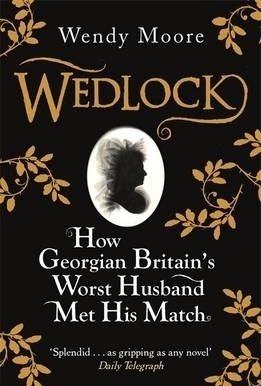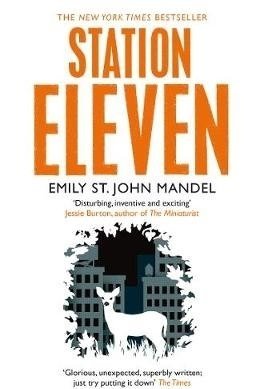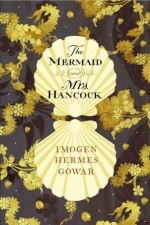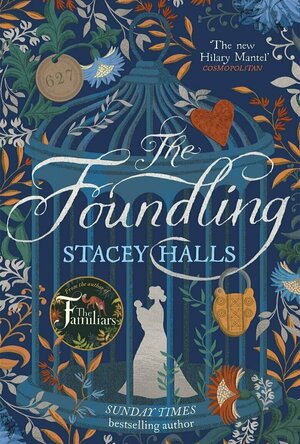Search
Search results
Sarah (7798 KP) created a video about track Why Georgia (with John Mayer (Adult Alternative)) by John Mayer in Room for Squares by John Mayer in Music
Mar 2, 2018 (Updated Mar 3, 2018)
Deborah (162 KP) rated Wedlock: How Georgian Britain's Worst Husband Met His Match in Books
Dec 21, 2018
True story of Georgian domestic violence. Makes you glad to be living in the modern world!
Entertainment Editor (1988 KP) created a video about My Happy Family (2017) in Movies
Dec 3, 2017
Deborah (162 KP) rated Lady Anne's Deception in Books
Dec 21, 2018
I read this on my Kindle, having recently been republished. Not quite sure why it was part of a trilogy marketed as Regency Royal as only the first book was set in the Georgian period - this was much later (early 20th century) and none of the books were related to each other at all. Heroine in this one a bit silly, but still, MC Beaton always gives you a good read.
Hazel (1853 KP) rated Station Eleven in Books
May 30, 2017
Horrifyingly Plausible
This ARC was provided by the publisher via NetGalley in exchange for an honest review
The dystopian idea of a virus wiping out most of the world’s human inhabitants is not a new concept. It has be done and retold over and over again. Emily St. John Mandel’s invention of the Georgian Flu is no different from these. Brought to Canada and the USA by a passenger on a plane from Russia, the highly contagious virus spreads quickly from person to person, town to town, and once caught you are dead within forty-eight hours.
The difference between Station Eleven and other novels of apocalyptic themes is that the story takes place primarily in two time periods – pre-Georgian Flu and twenty years post-Georgian flu – rather than during the outbreak and the immediate days after (although there are a few scenes written within that timeframe). It is difficult to explain the storyline without giving too much away. Although the death of millions of people is a vital feature, it is the lives of the characters that are important. All the significant characters are in some way linked to one man, Arthur Leander, and, particularly in the case of one individual, a graphic novel titled Station Eleven.
The book opens in Toronto with Arthur, a Hollywood actor, starring in a stage production of King Lear. Despite the quick reaction of trainee paramedic Jeevan, Arthur dies of a heart attack after suddenly collapsing during the forth act. Then suddenly, that same night, the Georgian flu makes its first appearance in Canada. Despite this occurring right at the beginning, it is not the last the reader sees of Arthur. Throughout the story the author returns to Arthur, recounting scenes of his life from acting career to his three ex-wives and only child.
Twenty years after the Georgian flu, Kirsten Raymonde, who starred as a child in the same production of King Lear, is part of the Traveling Symphony: a group of actors and musicians walking from decaying-town-to-town performing a number of Shakespeare plays as they go. With her she carries two Station Eleven comics that Arthur gave her before he died – incidentally written and drawn by his first wife. Most people that the Symphony encounter are accommodating and are trying their best to live in a world of no electricity or health care, but then they meet a man who calls himself the Prophet. Believing that he has been given a duty by God to repopulate the world he preaches to the people telling them that everything happens for a reason, likening the epidemic to Noah’s flood in the Bible. However it soon becomes clear that he is a dangerous character.
In a way it is heartening to imagine that high culture (such as Shakespeare and orchestral music) survives in a world that has been destroyed. Shakespeare was born in a time before all the modern inventions relied upon today, and now, in this novel, it is once again an electricity-less era yet these historical things live on.
One problem with Station Eleven is that it is hard to pinpoint the exact plot line. There is the life story of Arthur Leander, his wives and a close friend. Then there is Kirsten living a completely different life. Nonetheless it is still an incredibly fascinating book. Although it flits between time periods it is thankfully not as confusing as some may imagine it would be.
Even though dystopian novels of this nature have been done before, Station Eleven is definitely a book to read; and through it all it poses the question of how you, the reader, would survive in such a world.
The dystopian idea of a virus wiping out most of the world’s human inhabitants is not a new concept. It has be done and retold over and over again. Emily St. John Mandel’s invention of the Georgian Flu is no different from these. Brought to Canada and the USA by a passenger on a plane from Russia, the highly contagious virus spreads quickly from person to person, town to town, and once caught you are dead within forty-eight hours.
The difference between Station Eleven and other novels of apocalyptic themes is that the story takes place primarily in two time periods – pre-Georgian Flu and twenty years post-Georgian flu – rather than during the outbreak and the immediate days after (although there are a few scenes written within that timeframe). It is difficult to explain the storyline without giving too much away. Although the death of millions of people is a vital feature, it is the lives of the characters that are important. All the significant characters are in some way linked to one man, Arthur Leander, and, particularly in the case of one individual, a graphic novel titled Station Eleven.
The book opens in Toronto with Arthur, a Hollywood actor, starring in a stage production of King Lear. Despite the quick reaction of trainee paramedic Jeevan, Arthur dies of a heart attack after suddenly collapsing during the forth act. Then suddenly, that same night, the Georgian flu makes its first appearance in Canada. Despite this occurring right at the beginning, it is not the last the reader sees of Arthur. Throughout the story the author returns to Arthur, recounting scenes of his life from acting career to his three ex-wives and only child.
Twenty years after the Georgian flu, Kirsten Raymonde, who starred as a child in the same production of King Lear, is part of the Traveling Symphony: a group of actors and musicians walking from decaying-town-to-town performing a number of Shakespeare plays as they go. With her she carries two Station Eleven comics that Arthur gave her before he died – incidentally written and drawn by his first wife. Most people that the Symphony encounter are accommodating and are trying their best to live in a world of no electricity or health care, but then they meet a man who calls himself the Prophet. Believing that he has been given a duty by God to repopulate the world he preaches to the people telling them that everything happens for a reason, likening the epidemic to Noah’s flood in the Bible. However it soon becomes clear that he is a dangerous character.
In a way it is heartening to imagine that high culture (such as Shakespeare and orchestral music) survives in a world that has been destroyed. Shakespeare was born in a time before all the modern inventions relied upon today, and now, in this novel, it is once again an electricity-less era yet these historical things live on.
One problem with Station Eleven is that it is hard to pinpoint the exact plot line. There is the life story of Arthur Leander, his wives and a close friend. Then there is Kirsten living a completely different life. Nonetheless it is still an incredibly fascinating book. Although it flits between time periods it is thankfully not as confusing as some may imagine it would be.
Even though dystopian novels of this nature have been done before, Station Eleven is definitely a book to read; and through it all it poses the question of how you, the reader, would survive in such a world.
Hazel (1853 KP) rated Station Eleven in Books
Dec 7, 2018
<i>This ARC was provided by the publisher via NetGalley in exchange for an honest review</i>
The dystopian idea of a virus wiping out most of the world’s human inhabitants is not a new concept. It has be done and retold over and over again. Emily St. John Mandel’s invention of the Georgian Flu is no different from these. Brought to Canada and the USA by a passenger on a plane from Russia, the highly contagious virus spreads quickly from person to person, town to town, and once caught you are dead within forty-eight hours.
The difference between <i>Station Eleven</i> and other novels of apocalyptic themes is that the story takes place primarily in two time periods – pre-Georgian Flu and twenty years post-Georgian flu – rather than during the outbreak and the immediate days after (although there are a few scenes written within that timeframe). It is difficult to explain the storyline without giving too much away. Although the death of millions of people is a vital feature, it is the lives of the characters that are important. All the significant characters are in some way linked to one man, Arthur Leander, and, particularly in the case of one individual, a graphic novel titled <i>Station Eleven</i>.
The book opens in Toronto with Arthur, a Hollywood actor, starring in a stage production of <i>King Lear</i>. Despite the quick reaction of trainee paramedic Jeevan, Arthur dies of a heart attack after suddenly collapsing during the forth act. Then suddenly, that same night, the Georgian flu makes its first appearance in Canada. Despite this occurring right at the beginning, it is not the last the reader sees of Arthur. Throughout the story the author returns to Arthur, recounting scenes of his life from acting career to his three ex-wives and only child.
Twenty years after the Georgian flu, Kirsten Raymonde, who starred as a child in the same production of <i>King Lear</i>, is part of the Traveling Symphony: a group of actors and musicians walking from decaying-town-to-town performing a number of Shakespeare plays as they go. With her she carries two <i>Station Eleven</i> comics that Arthur gave her before he died – incidentally written and drawn by his first wife. Most people that the Symphony encounter are accommodating and are trying their best to live in a world of no electricity or health care, but then they meet a man who calls himself the Prophet. Believing that he has been given a duty by God to repopulate the world he preaches to the people telling them that everything happens for a reason, likening the epidemic to Noah’s flood in the Bible. However it soon becomes clear that he is a dangerous character.
In a way it is heartening to imagine that high culture (such as Shakespeare and orchestral music) survives in a world that has been destroyed. Shakespeare was born in a time before all the modern inventions relied upon today, and now, in this novel, it is once again an electricity-less era yet these historical things live on.
One problem with <i>Station Eleven</i> is that it is hard to pinpoint the exact plot line. There is the life story of Arthur Leander, his wives and a close friend. Then there is Kirsten living a completely different life. Nonetheless it is still an incredibly fascinating book. Although it flits between time periods it is thankfully not as confusing as some may imagine it would be.
Even though dystopian novels of this nature have been done before, <i>Station Eleven</i> is definitely a book to read; and through it all it poses the question of how you, the reader, would survive in such a world.
The dystopian idea of a virus wiping out most of the world’s human inhabitants is not a new concept. It has be done and retold over and over again. Emily St. John Mandel’s invention of the Georgian Flu is no different from these. Brought to Canada and the USA by a passenger on a plane from Russia, the highly contagious virus spreads quickly from person to person, town to town, and once caught you are dead within forty-eight hours.
The difference between <i>Station Eleven</i> and other novels of apocalyptic themes is that the story takes place primarily in two time periods – pre-Georgian Flu and twenty years post-Georgian flu – rather than during the outbreak and the immediate days after (although there are a few scenes written within that timeframe). It is difficult to explain the storyline without giving too much away. Although the death of millions of people is a vital feature, it is the lives of the characters that are important. All the significant characters are in some way linked to one man, Arthur Leander, and, particularly in the case of one individual, a graphic novel titled <i>Station Eleven</i>.
The book opens in Toronto with Arthur, a Hollywood actor, starring in a stage production of <i>King Lear</i>. Despite the quick reaction of trainee paramedic Jeevan, Arthur dies of a heart attack after suddenly collapsing during the forth act. Then suddenly, that same night, the Georgian flu makes its first appearance in Canada. Despite this occurring right at the beginning, it is not the last the reader sees of Arthur. Throughout the story the author returns to Arthur, recounting scenes of his life from acting career to his three ex-wives and only child.
Twenty years after the Georgian flu, Kirsten Raymonde, who starred as a child in the same production of <i>King Lear</i>, is part of the Traveling Symphony: a group of actors and musicians walking from decaying-town-to-town performing a number of Shakespeare plays as they go. With her she carries two <i>Station Eleven</i> comics that Arthur gave her before he died – incidentally written and drawn by his first wife. Most people that the Symphony encounter are accommodating and are trying their best to live in a world of no electricity or health care, but then they meet a man who calls himself the Prophet. Believing that he has been given a duty by God to repopulate the world he preaches to the people telling them that everything happens for a reason, likening the epidemic to Noah’s flood in the Bible. However it soon becomes clear that he is a dangerous character.
In a way it is heartening to imagine that high culture (such as Shakespeare and orchestral music) survives in a world that has been destroyed. Shakespeare was born in a time before all the modern inventions relied upon today, and now, in this novel, it is once again an electricity-less era yet these historical things live on.
One problem with <i>Station Eleven</i> is that it is hard to pinpoint the exact plot line. There is the life story of Arthur Leander, his wives and a close friend. Then there is Kirsten living a completely different life. Nonetheless it is still an incredibly fascinating book. Although it flits between time periods it is thankfully not as confusing as some may imagine it would be.
Even though dystopian novels of this nature have been done before, <i>Station Eleven</i> is definitely a book to read; and through it all it poses the question of how you, the reader, would survive in such a world.
Milleen (47 KP) rated The Mermaid and Mrs Hancock in Books
Jan 14, 2019
This historical drama is unusual but entertaining for anyone who loves period pieces with detail and a slightly surreal flourish. It has a beautifully described backdrop of 18th century London and a cast of characters that fill the pages with their dreams, obsessions and whimsies. Jonah Hancock is shocked to discover that the Captain of his ship has sold the vessel in exchange for… a mermaid. The acquisition of such a rare find catapults Hancock into the highest circles of society and into the path of Angelica Neal, a beautiful courtesan in need of assistance. Their journey is changed by the creature, leading you to ponder the power of these mythical creatures. An enjoyable Georgian romp.
ClareR (5556 KP) rated The Foundling in Books
Jan 14, 2020
Gothic historical fiction - just my cup of tea!
The Foundling is set in Georgian London, and is packed full of secrets. No-one in it appears to be telling the truth.
Bess Bright, a hawker of shrimps on London’s streets, leaves her newborn, Clara, at the London Foundling Hospital with every intention of reclaiming her when she is older. When Bess does return having saved the money to pay for the care her daughter has received over the last six years, it’s to discover that Bess Bright has already claimed her baby the day after she left her. So someone has taken her daughter.
In a much wealthier part of London, a widow is persuaded by her doctor to take on a nursemaid for her daughter. The widow rarely leaves her home, and doesn’t let her daughter play outside. The child’s only time outside is the journey to church at the Foundling Hospital every Sunday. The new nursemaid, along with the doctor, convince the widow that she should allow the child some times outside to play, and some fresh air.
This is just the tip of the iceberg though. The widow is a complex, damaged character who tries to hide from her past - but as secrets have a habit of doing, hers catch up with her. The nursemaid is instrumental in this.
The descriptions in this book are all so vivid - I was transported into the contrasting world of Georgian London and those who lived in poverty living alongside (streets away from) those who lived with unmentionable amounts of money. The oppression in the widows household was overwhelming: claustrophobic, even.
I loved everything about this book - I loved the gothic, suspense-filled atmosphere, and spent a large part of the book with my heart in my mouth!
Another wonderful book by Stacey Halls, and one I’d highly recommend reading!
Many thanks to The Pigeonhole for the reading AND the listening experience (I loved the narrators on the audio book!), and Stacey Halls for reading along, too!
Bess Bright, a hawker of shrimps on London’s streets, leaves her newborn, Clara, at the London Foundling Hospital with every intention of reclaiming her when she is older. When Bess does return having saved the money to pay for the care her daughter has received over the last six years, it’s to discover that Bess Bright has already claimed her baby the day after she left her. So someone has taken her daughter.
In a much wealthier part of London, a widow is persuaded by her doctor to take on a nursemaid for her daughter. The widow rarely leaves her home, and doesn’t let her daughter play outside. The child’s only time outside is the journey to church at the Foundling Hospital every Sunday. The new nursemaid, along with the doctor, convince the widow that she should allow the child some times outside to play, and some fresh air.
This is just the tip of the iceberg though. The widow is a complex, damaged character who tries to hide from her past - but as secrets have a habit of doing, hers catch up with her. The nursemaid is instrumental in this.
The descriptions in this book are all so vivid - I was transported into the contrasting world of Georgian London and those who lived in poverty living alongside (streets away from) those who lived with unmentionable amounts of money. The oppression in the widows household was overwhelming: claustrophobic, even.
I loved everything about this book - I loved the gothic, suspense-filled atmosphere, and spent a large part of the book with my heart in my mouth!
Another wonderful book by Stacey Halls, and one I’d highly recommend reading!
Many thanks to The Pigeonhole for the reading AND the listening experience (I loved the narrators on the audio book!), and Stacey Halls for reading along, too!
BookishWoo (317 KP) rated The Foundling in Books
May 24, 2020
This book had me hooked from the get go.
Having not yet read the "Familiars", Stacey's first book, I am unable to compare the 2, however if "The Foundling" is anything to go by I am sure I will not be disappointed.
Stacey truly has a beautiful writing style that brings the pages to life and draws you in right from the start.
She splits the narrative between two Protagonists, Bess and Alexandra. The former is a headstrong young woman who becomes pregnant at a fairly young age and due to her poor status has to place her daughter in The Foundling Hospital. The latter being a seemingly unstable wealthy Widow, appearing to suffer from Agoraphobia although as the story unfolds I would steer more towards P.T.S.D.
Set in the Georgian era, this is a story of class divides and Motherhood and how Bess' daughter brings the women together.
I highly recommend this to anyone.
Having not yet read the "Familiars", Stacey's first book, I am unable to compare the 2, however if "The Foundling" is anything to go by I am sure I will not be disappointed.
Stacey truly has a beautiful writing style that brings the pages to life and draws you in right from the start.
She splits the narrative between two Protagonists, Bess and Alexandra. The former is a headstrong young woman who becomes pregnant at a fairly young age and due to her poor status has to place her daughter in The Foundling Hospital. The latter being a seemingly unstable wealthy Widow, appearing to suffer from Agoraphobia although as the story unfolds I would steer more towards P.T.S.D.
Set in the Georgian era, this is a story of class divides and Motherhood and how Bess' daughter brings the women together.
I highly recommend this to anyone.
Deborah (162 KP) rated The River of No Return in Books
Dec 21, 2018
At nearly 600 pages, this isn't a short read (although the font is quite large.....) and although, after a slowish start, I did really get into the book, the ending left me feeling disappointed - not enough to give 4 starts this time. The right ingredients are all there, it's just that this is a pretty long book and at the end of it we got very little explanation or resolution of story threads. It was more like Part One of a larger novel than book one of a series because so little is resolved at the end of this, so it doesn't really work as a standalone novel.
My more usual reading matter tends towards historical fiction/mystery/romance, do maybe this was why I was happier once we were back in the Georgian period than in the modern, or maybe it just took a while to get going. We are nearly a third into the book before the big jump back in time takes place, so maybe it wasn't just a feeling. A lot of the stuff beforehand is trying to explain and set up the plot rather than just let it happen.
My more usual reading matter tends towards historical fiction/mystery/romance, do maybe this was why I was happier once we were back in the Georgian period than in the modern, or maybe it just took a while to get going. We are nearly a third into the book before the big jump back in time takes place, so maybe it wasn't just a feeling. A lot of the stuff beforehand is trying to explain and set up the plot rather than just let it happen.




